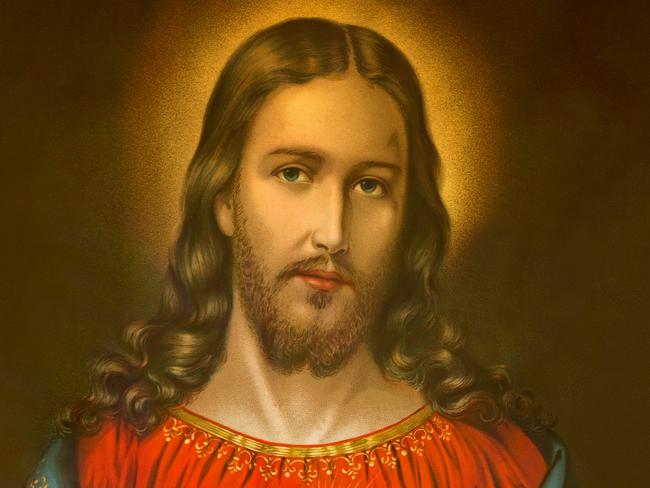Joe Hildebrand: Why we need to abandon zealotry and embrace pragmatism and peace – like Jesus
If we are to deal with our present mess, we need to abandon one-eyed zealotry and embrace a path of pragmatism and peace – just like a certain superstar did 2000 years ago, writes Joe Hildebrand.

Opinion
Don't miss out on the headlines from Opinion. Followed categories will be added to My News.
I was going to write about so many things this Saturday, but then I went to the opening night of Jesus Christ Superstar and now I can’t think about anything else.
First, let’s just get the housekeeping out of the way – it’s a ball-tearing banger of a show. Cancel your plans, abandon your family and get on it. That is literally what Jesus would have wanted.
We don’t talk about religion much in Australia. We do it, but we don’t talk about it.
Even when great clashes emerge – such as the tragically recurrent self-destruction of Israel and Palestine – we disguise religion as politics, as though they are the same thing.
They are not, and that is why we fail. And so countless UN resolutions propose endless and meaningless diplomatic and technocratic pathways to peace that have no end or meaning to those who are standing in the way of it.

Meanwhile, there is the sorrowful loneliness of the poor old folk in the middle who will get obliterated by the bombs of both sides as they wonder in their final moments why we can’t all just get along.
We can’t. As long as there is fanaticism and ideology and fundamentalism, we just can’t. Not to be too much of a Negative Nancy about it, but yes, everyone will die. This is hardly hysteria – on the contrary, it is literally happening right now. The only question is why and how to stop it.

For the answer, let’s turn to Jesus.
Both in the Bible and in the mountains of historiography about the most famous man on Earth, there is a mass of penetrating insights, confounding contradictions and soul-turning moments of inspiration.
The reason for all of this is Jesus himself. He was notoriously oblique.
He spoke in parables instead of dictates. He was a pragmatist in the face of radicals.
And in the octane-fuelled world of Roman-occupied Jerusalem, he preached peace instead of revolution – perhaps upsetting Judas.
Just pay your taxes to Caesar, he said. It hardly mattered anyway because the kingdom of God was at hand. As it turned out, the kingdom would be a long time coming.
It is clear from the New Testament alone that Jesus expected a huge and imminent metaphysical deliverance that failed to materialise and that scared and confused early Christians scrambling to make sense of this.
But here is the rub. Despite his repeated predictions that the new kingdom was at hand, Jesus constantly demanded that his followers give their money to the poor and embrace the socially despised; that they love their neighbours as themselves and do unto others as they would have done unto them; that they turn the other cheek in times of violence and – in times of judgment – they not commit the ultimate sin of hypocrisy by casting the first stone.
This, to me, is the most beautiful paradox of Christianity. It at once says that nothing matters in this life, only the next, and at the same time says we must care for people in the here and now.

And that is the point. For all the faith that powers it, Christianity is careful. For all its focus on the afterlife, it is a fierce protector of life here on Earth.
It celebrates martyrs yet forbids suicide; it promises eternal relief and rewards in death yet opposes assisted dying.
Smug and simplistic atheists cannot get past these contradictions, while fundamentalists simply ignore them. And yet they are merely a perfect reflection of all the contradictions and confusions that beset us all every day. That is what makes humanity human.
By contrast, it is the one-eyed zealots, those who are unwaveringly confident of themselves and their purpose, who are responsible for the worst inhumanities in history.
The Nazis, the Bolsheviks, Protestant witch-hunters and Catholic inquisitors, Islamist terrorists and Maoist revolutionaries.
These are the people – the certain, the sure and the simple – who have brought the most unspeakable destruction on humankind century after century. And if we look at Jerusalem today, we can still see their legacy and their continuing work.

This holiest and most fought over of cities belongs to neither Palestinian nor Jew, nor anybody else for that matter.
Jerusalem has changed hands more than 40 times throughout its history, and rarely been run by the two sides now demanding ownership. Even the Jews, for whom it is most sacred, took it from somebody else.
For most of its history, Jerusalem has been a colonial outpost, be it for the Babylonians, the Egyptians, the Romans, the Persians, the Ottomans or the British.
Is any of this right or pure or just? It doesn’t matter. It’s just history.
History is messy, just like the present.
And so if we are to deal with our present mess, we need to abandon one-eyed zealotry and embrace a path of pragmatism and peace.
Just like a certain superstar did 2000 years ago.
Download The Real Story with Joe Hildebrand wherever you get your podcasts
More Coverage
Originally published as Joe Hildebrand: Why we need to abandon zealotry and embrace pragmatism and peace – like Jesus





